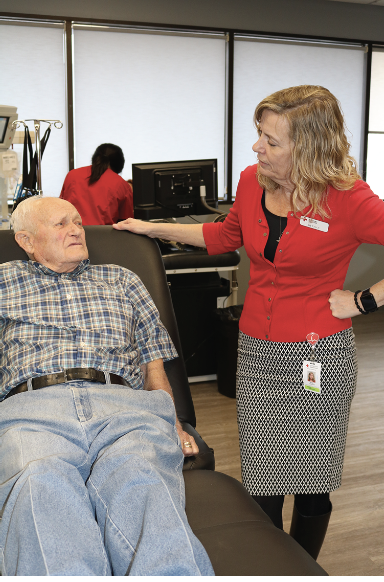You could say that giving blood got into Raymond Grier’s blood.
A World War II veteran who turned 97 in February, Grier donated a total of 40 gallons of blood before “retiring” as a donor last month.
“My uncle got me into it early,” Grier said. “His boss called him up once and said ‘send some men down here’ to a blood drive when I lived in Mt. Hope. I’ve lived in Wichita 52 years and kept donating here.”
Forty gallons, in case you’re wondering, is what a typical bathtub or hot water tank holds. Grier gave 320 units to reach the total. A donor can give whole blood every 56 days.
Not surprisingly, Grier is a favorite of employees at the Red Cross Wichita Blood Donation Center. He’s known for his sense of humor and for bringing black walnuts or pecans — which he picks and shells — to share with people there.
Last month, he surprised Red Cross staffer Betty Coonrod with a chocolate bar instead. She took his blood for several years before moving to another job.
“I’ve been at the center nine years, and every time he donates, he calls,” Coonrod said. “I come down [to the donor center] while he donates. He’s quick — it only takes like five minutes. He asks about my kids and grandkids.”
Grier’s late wife’s name was Betty, which he reminds Coonrod about frequently.
“I found my husband while I was working in the donor center. We started dating when I moved to education. Mr. Grier just knew. He was very happy for us,” said Coonrod.
Grier’s health and the wishes of his children are the primary reasons he’s ending his donation career. During his last visit, he asked every phlebotomist and fellow donor how they thought the Chiefs were going to do in the Super Bowl (pretty good, as it turns out). After his final donation, staff and other donors celebrated in the recovery room with cake, cookies, cupcakes and balloons.
Logan Wright, regional communications manager for the American Red Cross Kansas-Oklahoma Region, said it’s not unusual for people 60 and older to give blood and/or platelets. People of all blood types — especially those with type O blood — are critical to ensuring hospitals can meet the daily demand for lifesaving transfusions this winter.
“The need for blood is constant and there are many drives and locations at which a person could donate,” she said, adding that organization “depends on repeat donors” such as Grier.
If a medical issue prevents someone from giving blood, they can still volunteer at the Red Cross to host or help at blood drives, make deliveries to hospitals, assist in natural disaster recovery and perform other needed work, Wright said.
Grier has very simple words of wisdom for other Wichitans: “Go donate! It doesn’t hurt! It takes five minutes!”
To schedule a donation appointment, go to www.RedCrossBlood.org, download the Red Cross Blood Donor app, or call 1-800-REDCROSS.









